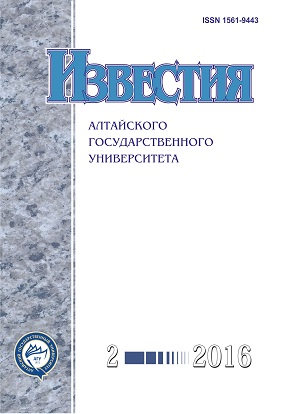Socio-Political Situation in Western Transbaikalia in the 1920‑s
Abstract
The article discusses the political mood of the population of Western Transbaikalia during the existence of the Far Eastern Republic. We present a general description of the political situation in the region, especially the national and social structure of the population. The emphasis is made on the reasons of dissatisfaction of the population with the Government of the Far Eastern Republic, heavy duties, and mobilization to the People’s Revolutionary Army. We consider the difference between the mood of the population in Western and Eastern Transbaikal, the characteristic of the anti-government armed units on the territory of Western Transbaikalia. Consideration is given to the reasons for the replenishment of military detachments with peasants and the reasons for their support by the local population. The authors show the role of the Whites and the remnants of the Semenov’s troops in the formation of anti-government armed groups. The article reveals the role of the invasion of Baron Ungern’s troops to Transbaikalia to change the sociopolitical situation, the political mood of the population in Western Transbaikalia and attitude of different layers of the population to Baron Ungern. General conclusions are made on the development of political mood in Western Transbaikalia during the existence of the Far Eastern Republic.
DOI 10.14258/izvasu(2016)2-12
Downloads
Metrics
References
Егунов Н.П. Очерки истории Дальневосточной республики. - Улан-Удэ, 1972.
История Бурятии : в 3 т. - Т. 3. XX-XXI вв. - Улан-Удэ, 2011.
Константинов А.В., Константинова Н.Н. Забайкалье: Ступени истории (1917-1922). - Чита, 2009.
Василевский В.И. Забайкальская белая государственность. - Чита, 2000.
Кузьмин С.Л. История барона Унгерна. Опыт реконструкции. - М., 2011.
Легендарный барон. Неизвестные страницы Гражданской войны / сост. С.Л. Кузьмин. - М., 2005.
Першин Д.П. Барон Унгерн. Урга и Алтан-Булак. - Самара, 1994.
Цыбиков Б. Разгром унгерновщины. - Улан-Удэ, 1947.
Атаман Семенов. О себе. Воспоминания. Мысли и выводы. - М., 2007.
Курас Л.В. Атаман Семенов и панмонгольское движение // Сибирь: век ХХ. - Кемерово, 2001.
Барон Унгерн в документах и мемуарах / сост. и ред. С.Л. Кузьмин. - М., 2004.
Государственный архив Читинской области (ГАЧО). - Ф. П81. - Оп. 1. - Д. 44.
ГАЧО. - Ф. П81. - Оп. 1. - Д. 46.
Российский государственный архив социальнополитической истории (РГАСПИ). - Ф. 372. - Оп. 1. - Д. 396.
РГАСПИ. - Ф. 372. - Оп. 1. - Д. 114.
Государственный архив Республики Бурятия (ГАРБ). - Ф. Р-185. - Оп. 1. - Д. 53.
РГАСПИ. - Ф. 372. - Оп. 1. - Д. 189.
Никифоров П.М. Записки премьера ДВР. - М., 1974.
Izvestiya of Altai State University is a golden publisher, as we allow self-archiving, but most importantly we are fully transparent about your rights.
Authors may present and discuss their findings ahead of publication: at biological or scientific conferences, on preprint servers, in public databases, and in blogs, wikis, tweets, and other informal communication channels.
Izvestiya of Altai State University allows authors to deposit manuscripts (currently under review or those for intended submission to Izvestiya of Altai State University) in non-commercial, pre-print servers such as ArXiv.
Authors who publish with this journal agree to the following terms:
- Authors retain copyright and grant the journal right of first publication with the work simultaneously licensed under a Creative Commons Attribution License (CC BY 4.0) that allows others to share the work with an acknowledgement of the work's authorship and initial publication in this journal.
- Authors are able to enter into separate, additional contractual arrangements for the non-exclusive distribution of the journal's published version of the work (e.g., post it to an institutional repository or publish it in a book), with an acknowledgement of its initial publication in this journal.
- Authors are permitted and encouraged to post their work online (e.g., in institutional repositories or on their website) prior to and during the submission process, as it can lead to productive exchanges, as well as earlier and greater citation of published work (See The Effect of Open Access).








